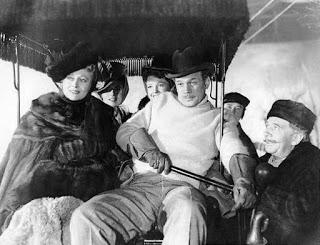 History remembers The Magnificent Ambersons (1942) as a missed opportunity. Orson Welles' follow-up to Citizen Kane suffered from studio mangling and reshoots, losing nearly 40 minutes of runtime. Whether we blame RKO or Welles, the finished product is elegantly directed but otherwise underwhelming.
History remembers The Magnificent Ambersons (1942) as a missed opportunity. Orson Welles' follow-up to Citizen Kane suffered from studio mangling and reshoots, losing nearly 40 minutes of runtime. Whether we blame RKO or Welles, the finished product is elegantly directed but otherwise underwhelming.George Amberson Minafer (Tim Holt) is the spoiled scion of a wealthy Indianapolis family. His mother Isabel (Dolores Costello) regrets marrying the boring Wilbur Minafer (Don Dillaway) instead of Eugene Morgan (Joseph Cotton), who's become a successful auto tycoon. George tries to court Eugene's daughter Lucy (Anne Baxter), but she's disgusted with George's refusal to make something of himself. George is enraged when he learns that Eugene's in love with his long-suffering Aunt Fanny (Agnes Moorehead). Only when family fortunes dissolve does George spring into action.
Though Booth Tarkington's novel won the Pulitzer Prize, The Magnificent Ambersons is pretty thin stuff. It's a melodrama bemoaning the emptiness of the idle rich; Tarkington's no Thomas Mann and Ambersons isn't Buddenbrooks, with characters more insipid than memorable. Welles strains for significance by emphasizing modernity's negative impact, yet viewers likely won't embrace George's railing against the evils of automobiles. The movie winds through underdeveloped romances and petty, mannered whining with a climax so ironic it's sickening.
Fortunately, Welles' direction is engaging enough to redeem the flaccid story. Stanley Cortez's photography matches Gregg Toland's work on Kane, with mesmerizing deep focus and shadows sprinkling the cavernous Amberson mansion. Welles indulges in sumptuous long takes: George and Fanny pacing in and out of shadows, a tracking shot of George and Lucy bidding farewell on a street, ancient Major Amberson (Richard Bennett) musing over the family's fortune in close-up lit by cucoloris, light slowly fading to pinpricks of his eyes.
Tim Holt, serviceable enough in Treasure of the Sierra Madre and other Westerns, is thoroughly miscast. Admittedly George is a callow character, but Holt's simpering performance makes him even less likeable. Fortunately, the supporting cast: Joseph Cotton grants Eugene a subtle air of repressed longing, matched by Agnes Moorehead's tragic intensity. Anne Baxter is a fresh-faced romantic lead, airily spurning George's brickheaded advances. Mercury players Ray Collins and Erskine Sandford feature in other key roles.
It's hard to say whether The Magnificent Ambersons would have worked better in Welles' original two hour cut; certainly RKO's meddling can't have helped. Yet some fault must lie with the story, an overrated novel about self-pitying aristocrats. It's a credit to Welles that the film works as well as it does.

